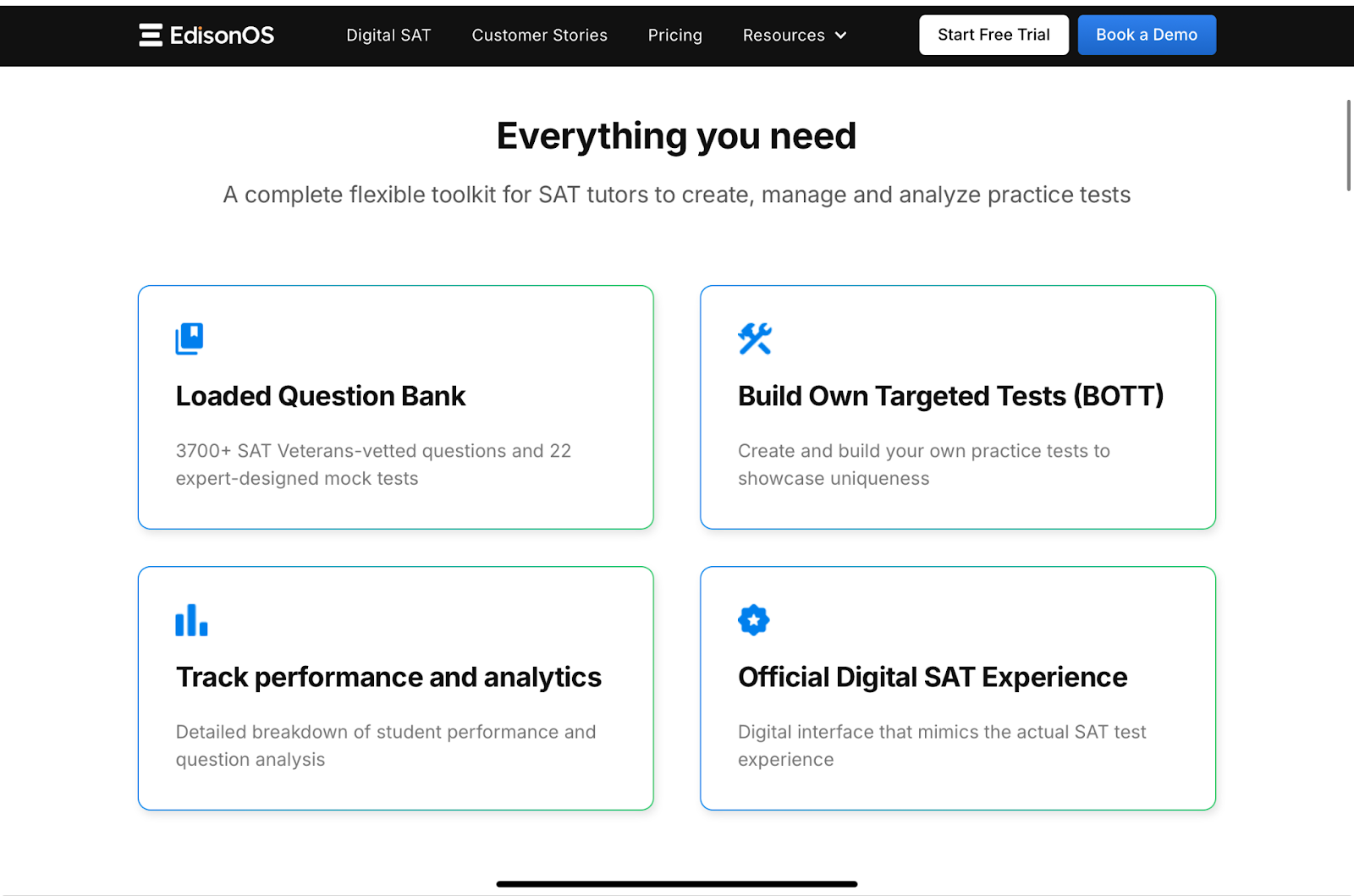



Key Takeaways
- Create a supportive environment to reduce SAT-related anxiety and boost student confidence.
- Encourage healthy habits like sleep, exercise, and nutrition for better test performance.
- Focus on progress over perfection to help students manage pressure and stay motivated.
The SAT is a major milestone for high school students, and the stress surrounding it can be overwhelming. The pressure to achieve a high score, the fear of underperforming, and the extensive preparation required can cause significant anxiety.
As a parent or educator, your role is crucial in helping students navigate this challenge with confidence. By creating a structured and supportive environment, encouraging healthy habits, and reinforcing a positive mindset, you can help ease the burden.
This article offers practical SAT stress management tips for parents and educators to ensure a healthy and supportive environment.
Why SAT Stress is a Common Challenge for Students
The SAT is a high-stakes test that plays an important role in college admissions, making it a major source of stress for students. The anxiety stems from several factors, including performance pressure, time constraints, and uncertainty about the test format. Understanding the root causes of SAT stress allows parents and educators to provide the right kind of support.
Common reasons for SAT stress
Fear of failure
Many students worry that a low SAT score will negatively impact their college prospects and limit their chances of getting into their dream schools. This fear often stems from internal pressure, external expectations, and a misunderstanding of how colleges evaluate applications holistically.
When students believe that their entire future depends on a single test, the anxiety can become overwhelming, leading to procrastination, burnout, or even test-day panic.
Parental and peer pressure
While encouragement from parents and peers can be helpful, excessive pressure can have the opposite effect. Some students feel they must meet unrealistic expectations set by family members or outperform their classmates, leading to stress and self-doubt.
The comparison culture, especially with social media glorifying achievements, can make students feel inadequate or unprepared.
Time management struggles
Between schoolwork, extracurricular activities, etc., finding time for SAT prep can be daunting. The challenge of fitting in study sessions while maintaining good grades and personal well-being often leaves students feeling overwhelmed and unprepared, making them more prone to stress and last-minute cramming.
Also read: How to Prepare for the Digital SAT in One Month
Lack of familiarity with the test
Uncertainty about the SAT breakdown can contribute significantly to test anxiety. Students who have not taken full-length practice tests or studied the exam format may feel lost when faced with unfamiliar question types and time constraints.
The fear of encountering difficult sections, not knowing how to manage time effectively, or struggling with complex questions can make the test seem much more intimidating than it actually is. Without proper exposure to the SAT format, students often feel unprepared, even if they have strong academic abilities.
By addressing these concerns early, parents and educators can help reduce the emotional and mental burden of the SAT.
Also watch: Unlocking Success: The Power of Familiarity in Digital SAT Training
Signs Your Student is Stressed About the SAT
Recognizing the signs of SAT-related stress is essential for providing timely support. Some students may openly express their anxiety, while others may suppress it. Being aware of these signs can help parents and educators step in before the stress becomes overwhelming.
Key indicators of test anxiety
- Procrastination or avoidance: Delaying studying or refusing to talk about the test
- Irritability and mood swings: Increased frustration or withdrawal from family and friends
- Sleep disturbances: Difficulty falling asleep or excessive sleeping due to exhaustion
- Physical symptoms: Complaints of headaches, stomachaches, or general discomfort
- Negative self-talk: Statements like “I’ll never do well” or “I’m not smart enough.”
If you notice any of these behaviors, it’s time to implement strategies to help your student manage their stress effectively.
SAT Stress Management Tips for Parents
A positive and supportive environment can make a significant difference in how students approach SAT preparation. Educators should focus on reducing pressure, providing encouragement, and ensuring a structured study plan.
Ways to create a stress-free SAT prep environment
- Encourage open communication: Let students express their concerns without fear of judgment.
- Set realistic expectations: Help them understand that the SAT is just one part of the college admissions process.
- Provide the right study resources: Introduce them to digital SAT prep tools for structured learning and the digital SAT scoring algorithm.

- Balance study and relaxation: Avoid excessive pressure by ensuring downtime between study sessions.
A supportive environment helps students stay motivated, reducing anxiety and improving overall performance.
Also read: How to Prepare for the Digital SAT
Practical Tips to Reduce SAT-Related Stress
Reducing SAT stress requires a combination of emotional support, structured planning, and effective study strategies. Implementing these practical tips can help students feel more confident and less overwhelmed.
The anxiety-reducing battle plan for test day
Creating a structured plan for test day eliminates uncertainty and helps students feel more in control. Planning everything in advance ensures a smooth and stress-free experience.
- Set bedtime and wake-up times for the night before and the morning of the test.
- Plan breakfast and outfits in advance to avoid last-minute decisions.
- Prepare test materials (admission ticket, ID, calculator, pencils) the night before.
- Decide on departure time and test location route to prevent rushing.
- Consider visiting the test center beforehand to familiarize your student with the setting.
How this helps: Eliminates last-minute panic, helping students stay calm and focused on the test.
Explain that test scores do not define self-worth
Many students equate their SAT score with self-worth, leading to unnecessary stress. Parents and educators must reinforce the idea that a student’s value extends beyond a test score.
- Highlight other achievements: Good grades, extracurricular involvement, leadership, and personal strengths matter just as much.
- Encourage a strengths-based perspective: Have students create a college resume that showcases their full range of talents
How this helps: It shifts the focus from pressure to personal growth, boosting confidence.
Also read: How to Prepare for Digital SAT Exam 2025
Encouraging Healthy Habits During SAT Preparation
Good habits play a critical role in reducing stress and ensuring students are both mentally and physically prepared for the SAT. Encouraging a healthy lifestyle can significantly improve focus, retention, and overall well-being throughout the preparation process. Here are key habits that can help students perform their best.
Prioritize sleep for better cognitive function
Sleep deprivation negatively impacts memory, focus, and problem-solving skills - all essential for SAT success. Establishing a consistent sleep routine at least two weeks before the test is crucial.
Encourage students to wind down at least an hour before bedtime by turning off screens, engaging in a calming activity, and preparing their study materials for the next day. The goal is to ensure they wake up feeling refreshed and ready to tackle their studies.
Incorporate exercise into the daily routine
Physical activity is one of the most effective ways to reduce stress and boost cognitive function. Encourage students to engage in moderate exercise, such as a short jog, yoga, or even a 15-minute walk.
Exercising the day before the test or even the morning of can help release tension and promote a calm, focused mindset.
Encourage proper nutrition for brain function
Diet plays a major role in concentration and energy levels. Encourage students to eat a balanced diet rich in protein, healthy fats, and complex carbohydrates to sustain focus during study sessions.
On test day, a nutritious breakfast - such as eggs, whole grains, and fruit - can provide sustained energy and prevent hunger-related distractions during the exam.
Avoid heavy, sugary, or processed foods that may cause sluggishness or energy crashes.
Practice relaxation techniques and mindfulness
Teaching students how to manage stress through relaxation techniques can significantly impact their performance. Deep breathing exercises, guided meditation, and mindfulness practices can help calm nerves before and during the test.
Even simple activities like stretching, listening to calming music, or practicing gratitude can promote relaxation and reduce anxiety.
Engage in fun, stress-relieving activities
SAT preparation doesn’t have to be all-consuming. Encourage students to take regular breaks to do activities they enjoy, such as hobbies, creative projects, or socializing with friends.
Taking time to recharge helps prevent burnout and allows students to return to studying with a fresh and focused mindset.
Plan something enjoyable after the test
Having a post-test reward gives students something to look forward to beyond the SAT.
Whether it’s a fun outing, a favorite meal, or simply a relaxing day off, planning a stress-free activity can help shift focus away from the pressure of test performance and towards celebrating their hard work and effort.
Encouraging these healthy habits can lead to better focus, improved mental well-being, and a more positive overall experience with SAT preparation.
Help Your Students Build Confidence and Resilience
Confidence plays a huge role in SAT success. Students who feel prepared and resilient are less likely to succumb to stress.
Take full-length practice tests

Practicing under real test conditions builds familiarity and reduces anxiety.
- Use official practice tests, such as the ones available on EdisonOS to simulate the test experience.
- Analyze mistakes and focus on weak areas for improvement.
How this helps: It helps students feel more prepared and confident on test day.
Let go of perfectionism
Students often put unnecessary pressure on themselves to achieve a perfect score. Teaching them to focus on progress rather than perfection is key.
- Encourage patience and self-compassion during the study process.
- Reassure them that one test will not determine their future.
How this helps: Promotes a healthy mindset that prioritizes learning over stress.
Reduce SAT Stress with EdisonOS
SAT stress is a real challenge, but with the right strategies, parents and educators can make a significant difference. By creating a supportive environment, encouraging healthy habits, and using structured study tools like EdisonOS, students can navigate SAT prep with confidence and composure.

Helping students understand that their value extends beyond test scores, reinforcing positive habits, and providing the right resources ensures they perform their best without feeling overwhelmed. With preparation, encouragement, and balance, students can turn the SAT from a stressful event into a manageable challenge.
FAQs About Reducing SAT Stress
How can I help my child manage SAT anxiety?
Create a structured yet flexible study plan and encourage taking practice tests to build confidence. Teach relaxation techniques like deep breathing and visualization, and remind them that their worth isn’t tied to their score.
What should I avoid saying to my child during SAT prep?
Avoid pressuring statements like “This test determines your future” or comparisons with other students. Instead, focus on encouragement, effort, and progress to keep stress levels low.
Are there tools or apps to help reduce SAT stress?
EdisonOS is one of the most loved SAT prep platforms structured study plans, while Headspace and Calm help with relaxation. Using a Digital SAT scoring tool can also track progress and set realistic goals.
How can I balance encouragement without adding pressure?
Set realistic expectations, celebrate small achievements, and allow breaks. Instead of focusing on scores, check in on how they are feeling and support their overall well-being.
What role do tutors play in reducing SAT stress?
Tutors provide personalized strategies, targeted support, and motivation. Platforms like EdisonOS help make learning structured, reducing stress and improving confidence.
Recommended Reads
Recommended Podcasts















.webp)
